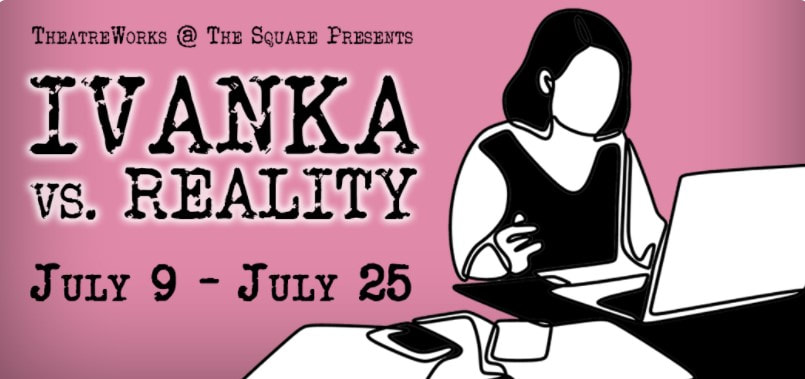|
Meghan Lewis is of two minds when it comes to directing one of the first live-attendance shows of the post-pandemic Memphis theatre world.
“It feels a little like a blessing and a curse, but more like a blessing,” she laughs. “People are so thrilled to be back doing live theatre. The designers and actors and production team are all fresh and sharp and it has just been a delight from start to finish.” Lewis is making her Memphis directing debut with Ivanka vs. Reality at TheatreWorks. It’s the latest offering from Playhouse on the Square’s New Works at the Works competition, which produces two world premier plays every season. Ivanka vs. Reality is a small, four person play that primarily deals with themes of perception. The creative genesis of the piece came from a, perhaps, surprising source: a quote from American businesswoman and former first daughter Ivanka Trump. “Perception is more important than reality. If someone perceives something to be true, it is more important than if it is in fact true.” In some ways, the source material was the first challenge of the show. “I feel the Trump name sort of colors people’s perception before they come into the show,” says Lewis. “But that’s sort of what we are dealing with in the play anyway: how you perceive people and situations and how that perception changes your feelings and where those assumptions can lead you.” This consideration of what constitutes perception is the driving force behind this new work that, while being inspired by an Ivanka, and featuring a (different) Ivanka, has very little to do with the Trump family or anything related to American politics. The story follows a screenwriter/single mother who, after being black-balled for reporting an unwanted sexual advance from a powerful film producer, takes a freelance job writing a supposedly biographical screenplay about the life and trials of a Midwestern waitress (the titular Ivanka) and her inspiringly sick child. That would all be well and good if Ivanka’s story was actually accurate, but the waitress cares more about her message than what actually happened. Ivanka vs. Reality is primarily a play about relationships, and how they are perceived and presented, and the chaos that can result when those perceptions don’t line up. All of this is set against the backdrop of the fast-paced illusory world of Hollywood screenwriting, where real people make real money creating fantasies that are sometimes based on reality but never fully real. This fundamental paradox of the entertainment business is reflected in the fractured relationships of the characters in Ivanka. “Everyone’s perception of what is going on in the world and what is going on in their everyday lives is their own reality,” describes Lewis. “And that can come into conflict when two people perceive the same thing two different ways. One person thinks an intended compliment was an insult or that something positive was intended negatively. So in this show, I feel it’s been my responsibility to take on that challenge of perception. And hopefully address those challenges with kindness and dignity and respect. But it’s tough, because everyone’s brain isn’t the same.” That last thought is especially worthy of consideration as Memphis, and the larger world, is just recently starting to come out of one of the most mentally taxing periods in recent memory. Isolation, division, and societal frustration are common themes in modern culture and Ivanka vs. Reality tackles these problems on a personal level. Mental health and its predominance in shaping our lives defines the play, according to Lewis. “The ways that we deal with mental health as a society... we’re not great at it yet. Our brains are mysterious universes. And it’s terrifying finding yourself in a situation where your perceptions are so altered that you can’t find the line between the real and the unreal. That’s a big challenge in this play. One character has no control over his perception. One purposefully chooses to alter her perception from what is factual truth. Another seems to do it almost subconsciously because that’s how she’s been raised and conditioned. And one is stuck in the middle trying to decide which is the best option. And the audience gets to decide the same thing for themselves: which is the best sort of mind to exist in? Personally, I think we as a society will get better when we start to look at mental health as a spectrum we all live on and not just as this idea that there’s a “normal” brain that we all need to have.” Lewis hopes that this dive into the question of how the world is viewed by these multiple characters will ultimately allow for some self-examination. After all, in a play about fractured perception, the ultimate viewpoint may belong to the audience. “There’s so much nuance and ambiguity in this script. The play ends in a very ambiguous way. We actively chose not to be definitive at the end. What I hope is that rather than people scratching their heads and not being sure what the ending was supposed to be, that they will leave the theatre thinking about it and maybe creating their own reality about what the conclusion is. The thinking is the point.” Perhaps, after being locked up for so long, an open and curious mind is what we all need as we head into this new world and new season of theatre? Ivanka vs Reality has four streaming shows remaining before closing Sunday, July 25. Go to www.playhouseonthesquare.org to purchase tickets for streaming. The Ostranders organization is committed to honoring and supporting excellence in theatre throughout the Memphis area. If you are interested in writing for us, please contact Elizabeth Perkins at [email protected].
0 Comments
|
Archives
July 2023
Categories
All
|


 RSS Feed
RSS Feed
